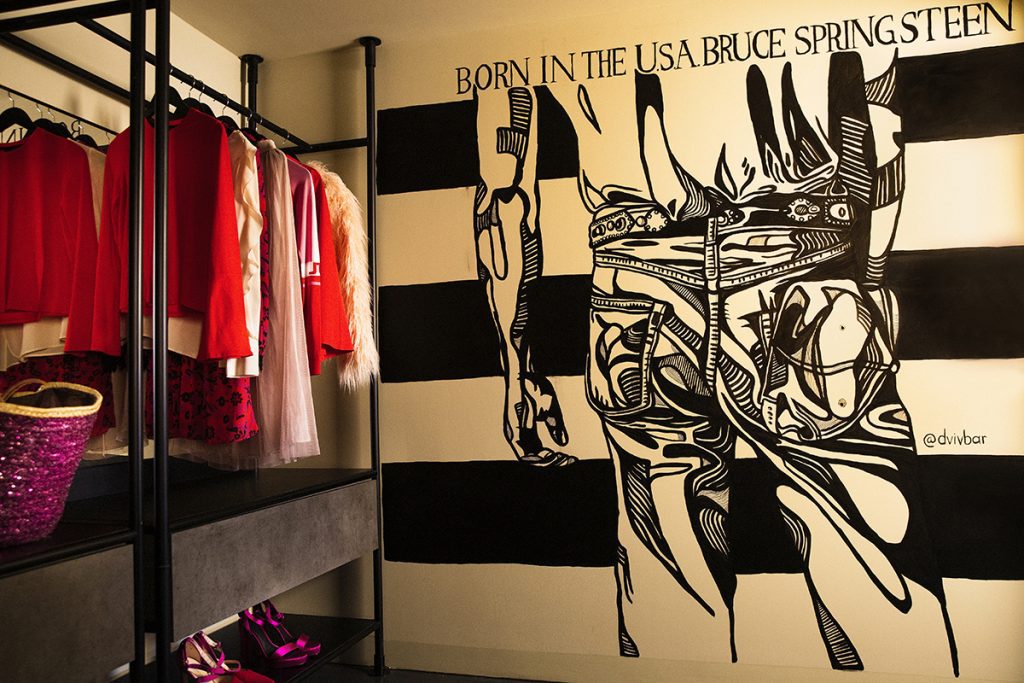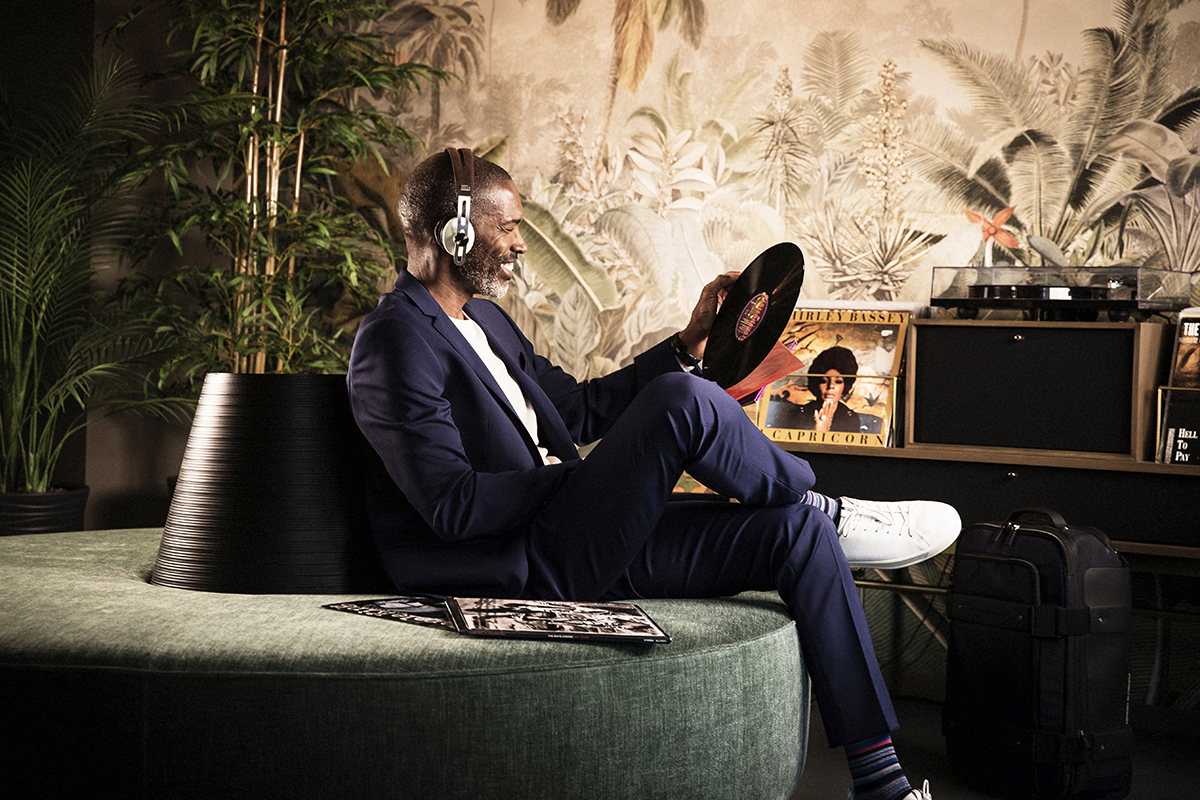Skift Take
The Jams Music Hotel in Munich spotlights how boutique hotels created by individuals and small companies can thrive in the shadow of behemoth corporations. It helps to have lots of character and a feisty soul.
When guests walk into Jams Music Hotel in Munich, Germany, they encounter a floor-to-ceiling mural of Prince and a chance to pick out albums from the hotel’s vast collection of vinyl to play on the record player in their room.
“From this first moment with the guest, we have a connection, and it starts with the records they can borrow,” said Alexander Kaufmann, the boutique hotel’s founder.
Kaufmann needs to win visitors’ hearts — and ears — right away with his six-story, 65-room property. Independently owned boutique hotels face financing and distribution disadvantages relative to the global chains. The story of Jams tells a broader tale about how boutique hotels created by individuals and small companies can thrive in the shadow of behemoths.
99 Luftballons
Genuine boutique hotels, like Jams, contend with faux boutique brands from much better-capitalized owners. Yet Kaufmann thinks being small has its upsides. Casting a more personal eye on design elements can make a place memorable. By creating a more intimate relationship with guests, a hotel can encourage more word-of-mouth recommendations.
Jams has a ’70s music-themed interior that strives to look less “corporate” than chain music hotels like Hard Rock Hotels. The distinctiveness has helped with grass-roots marketing.
“As soon as people walk in, they take photos and post them on social media,” Kaufmann said.
Jams opened in 2019 to early accolades, winning the Tophotel Newcomer Award in 2019 and the German Brand Award in 2021.
Some critics liked how its sleek exterior fit with the trendy residential Haidhausen neighborhood. Some guests liked its closeness to a major train station and the city’s Gasteig cultural center — home to beer gardens, rock venues, and the Munich Philharmonic. The property has appeared to cut through the noise the way the song “99 Luftballons” went viral in the ’80s in Germany.
Goodbye Yellow Brick Road
Germany stuck with off-and-on pandemic-related restrictions longer than some other markets, such as the U.S. and Britain. Repeated opening and closing took a toll on hotels.
“It takes months and years to be established and successful, and always being shut off after a short re-start — it was challenging,” said Kaufmann.
“When you re-start, you have to find your rankings back on OTAs [online travel agencies],” Kaufmann said. “I also own restaurants, and you’d be back in one or two days after a lockdown lifted, but a hotel needs time.”
Re-staffing the hotel was a challenge, too.
“It took me more than a half year to get a chef for the hotel kitchen,” Kaufmann said. “So I had to help train staff who had never worked in a kitchen before.”
Back to Black
Since early 2022, Kaufmann has gained speed. His hotel now has a high percentage of direct bookings, — thanks to social media, ads on Google, and repeat customers.
“We don’t have more than 50 percent through OTAs [online travel agencies] — the rest comes from direct booking,” said Kaufmann. Still, a small boutique hotel needs to stay in the online travel players’ good graces.

Imagine
Kaufmann launched Jams after spending years working in the restaurant and real estate development industry, where he often helped to design hotels. A Munich native, he first set about finding a suitable location to build out his idea.
“I was looking around for a place without a specific plan or concept,” Kaufmann said. “But I wanted to create something unique, which depends on the location and the building itself — and you have to adapt a bit to that.”
He found an ordinary, three-star hotel and renovated it from the inside out, keeping only the building’s shell. The proximity to the Gasteig, Munich’s music and cultural arts district, gave him the idea for the “music hotel” concept.
He drew on Munich’s music boom in the 1970s to craft the aesthetic. Donna Summer recorded “Love to Love You Baby” in Munich. After that, artists like Iggy Pop and Led Zeppelin came flocking.
Heroes
Kaufmann likes how being an independent boutique hotel lets Jams write its own rules — like putting free minibars in guestrooms and running live music events on Saturdays.
“Everything from A to Z in the hotel is connected to music, even the lamps on the staircase, which are designed to look like records,” Kaufmann said.
The restaurant tables all have etched grooves that resemble records, and the bikes you can borrow have names like “Ozzie” and “Slash.”
Believe
By the end of 2022, Kaufmann plans to sign a lease for another Jams location at Lake Tegernsee, an upscale lake located at the base of the Alps, just an hour by car to the south of Munich.
“It won’t be 100 percent the same design, but it will have the same design language, always with a music theme,” said Kaufmann.
After that, Kaufmann envisions launching as many as two Jams hotels a year in German cities like Frankfurt, Hamburg, Düsseldorf, Cologne, and Berlin.
As ever, the catch will be financing — a particular challenge for boutique hotels, especially with a likely bruising recession on the horizon.
“I am hoping the banks will put back some trust into hotels,” he said. “We are not the banks’ darlings at this time.”
Control
Many independent hoteliers do a delicate dance with distribution middlemen. For now, Kaufmann is focused on creating a personal connection with each of the online travel agencies in hopes of coming up with an understanding that’s profitable for all parties. Often, their suggestions aren’t in the best interest of a boutique hotel.
“I just don’t want to do only discounts, discounts, discounts,” said Kaufmann.
Big chains, of course, are less reliant on online travel agencies because they have the infrastructure to manage their own booking systems and often have large enough footprints to have flourishing loyalty programs. They can also negotiate volume discounts on commissions.
Still, indie boutiques enjoy some of their advantages over the big hotel groups that may matter more than distribution.
“We are a unique hotel, and guests want that distinctive experience,” Kaufmann said.
Daily Lodging Report
Essential industry news for hospitality and lodging executives in North America and Asia-Pacific. Delivered daily to your inbox.
Have a confidential tip for Skift? Get in touch
Tags: boutique hotels, experiential, future of lodging, germany, independent hotels, music
Photo credit: A guest listens to one of the many records available to borrow in the lobby of the Jams Music Hotel in Munich, Germany. Frank Lübke Photography. Source: Jams Music Hotel.
